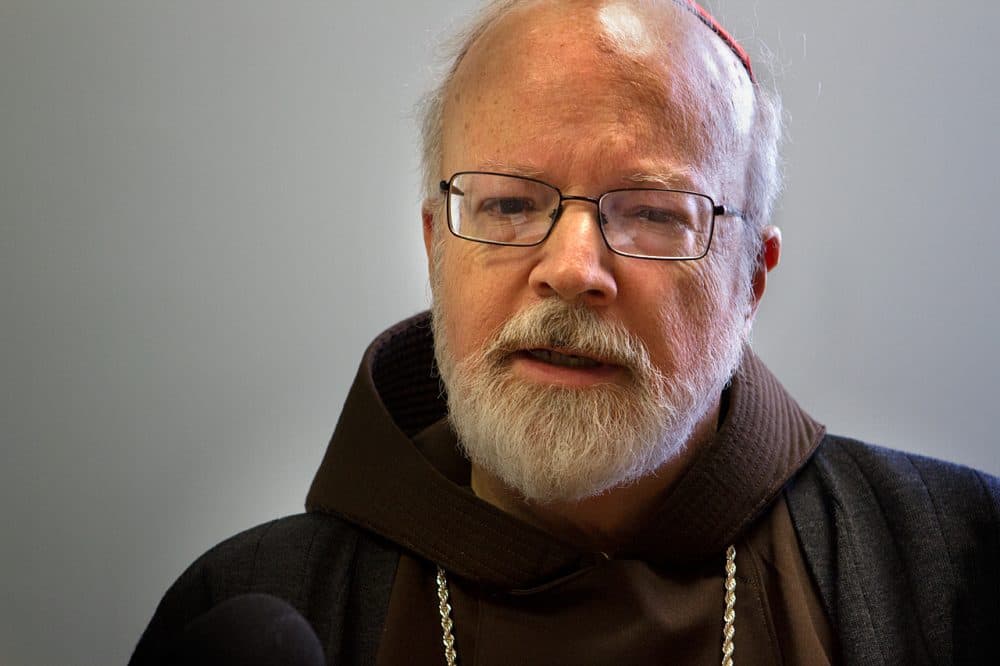Advertisement
Cardinal O'Malley Apologizes For His Office's Handling Of Letter Regarding Disgraced Archbishop

Boston Cardinal Sean O'Malley is apologizing for how his office handled a letter that raised concerns about the disgraced former archbishop of Washington, D.C., Theodore McCarrick.
The letter was sent three years before McCarrick resigned from the College of Cardinals this summer amid allegations he sexually abused minors and adult seminarians.
O'Malley says it was a mistake that the letter was never brought to his attention, and he says he will modify his office procedures so something like this never happens again.
In a statement released Monday, O'Malley said the 2015 letter never made it to his desk because it involved alleged sexual abuse of adults, and his office focused on the protection of minors.
So his secretary responded, instead. O'Malley says he only learned of the sexual crimes allegedly committed by McCarrick from recent media reports.
This is O'Malley's second stastement on the accusations, but the first in which he takes responsibility for the failures of the office policies.
"I take responsibility for the procedures followed in my office and I also am prepared to modify those procedures in light of this experience," he wrote.
With reporting from WBUR's Jonathan Cain.
Read the letter in full below:
In June of 2015 Rev. Boniface Ramsey sent a letter that was received at my office at the Archdiocese of Boston’s Pastoral Center. Rev. Robert Kickham, my Priest Secretary, received the letter on my behalf, as he does much of the correspondence that comes to my office at the Pastoral Center. Fr. Ramsey’s letter came to me in my role as President of the Pontifical Commission for the Protection of Minors; specifically the letter presented matters concerning Archbishop McCarrick’s behavior with seminarians. Fr. Kickham’s response to Fr. Ramsey noted that individual cases such as he proposed for review fell outside the mandate of the Commission. Consequently, he did not bring the letter to my attention. In retrospect it is now clear to Fr. Kickham and to me that I should have seen that letter precisely because it made assertions about the behavior of an Archbishop in the Church. I take responsibility for the procedures followed in my office and I also am prepared to modify those procedures in light of this experience.
My first knowledge of Fr. Ramsey’s letter occurred when media reports of the letter were published last month. I apologize to Fr. Ramsey for not having responded to him in an appropriate way and appreciate the effort that he undertook in seeking to bring his concerns about Archbishop McCarrick’s behavior to my attention. I also apologize to anyone whose concerns were reflected in Fr. Ramsey’s letter.
Allegations regarding Archbishop McCarrick’s sexual crimes were unknown to me until the recent media reports. I understand not everyone will accept this answer given the way the Church has eroded the trust of our people. My hope is that we can repair the trust and faith of all Catholics and the wider community by virtue of our actions and accountability in how we respond to this crisis.
What makes all this so difficult to understand is that it has been my experience that when a priest is being vetted to be named a bishop, any doubt or question concerning his faithfulness to his promise of celibacy would result in removing his name from consideration to be named Bishop. The Bishops Conference is anxious to understand how Theodore McCarrick could have been named Bishop, Archbishop and Cardinal. We must be certain that this never happens again. That is why the Bishops Conference are requesting an investigation by the Holy See with the participation of lay people.
Let me close with the words of Pope Francis who yesterday wrote: “Let us beg forgiveness for our own sins and the sins of others. An awareness of sins helps us to acknowledge the errors, the crimes and the wounds caused in the past and allows us, in the present, to be more open and committed along a journey of renewed conversion.